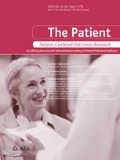Braillon [1] challenges the legitimacy of patient associations participating as partners by repeating unsubstantiated popular rhetoric suggesting that patient associations receiving industry support are by association influenced by those industry sources. His criticism is akin to the implication in the recent paper by McCoy et al. [2] entitled “Conflicts of Interest for Patient-Advocacy Organizations”, which found that a large percentage of a sample of patient advocacy organizations received some industry funding but, in fact, provided no evidence of conflicts of interest in the activities of the organizations. Braillon states that industry’s first goal is to create value for its shareholders, and I can state categorically that a patient organization’s first goal is to serve the needs of its patient community. Where these may be ‘in conflict’, in my experience, the patient organization always goes with the patient interests; no compromise. Would we suspect every decision made by a ‘fee-for-service’ physician to be biased by financial considerations, or are these balanced by the interests of the patients?
In his second point challenging legitimate partnership between government decision makers and genuinely “independent patient and citizen voices”, Braillon ironically positions the conflict as emanating from the “cost-constrains or economic issues” that are “major issues” for the government agencies.
In reply to Braillon's third point, patients have expertise in many fields, such as medicine, legal, business, and academic; we do not lose these as patients. Moreover, patient advocates spend hundreds of hours, mostly unpaid, to gain expertise in strategic planning and communications as well as research, health economics, and pharmacovigilance. AIDS activists are not exceptions but rather just one example of the wealth of expertise contributed by patients from all disease areas.
Personally, I was a research and practicing psychologist for 30 years before deciding to dedicate myself to patient advocacy. I served as the volunteer lead for several patient charities prior to taking my current role as a staff member. And I still spend almost half of my time as a volunteer with many small patient groups, many of which receive no industry funding. I don’t believe anyone could find a difference in my actions based on whether the group was industry-funded or not.
Patients have earned the right to be partners, and, in my experience, most of us are accorded that respect.
References
Braillon A. Comment on: “Moving from patient advocacy to partnership: a long and bumpy road” [letter]. Patient. 2017. doi:10.1007/s40271-017-0216-1.
McCoy MS, Carniol M, Chockley K, Urwin JW, Emanuel EJ, Schmidt H. Conflicts of interest for patient-advocacy organizations. N Engl J Med. 2017;376(9):880–5.
Author information
Authors and Affiliations
Corresponding author
Ethics declarations
Funding
This letter received no funding support.
Conflict of interest
The author has no conflicts of interest with respect to this letter.
Additional information
This reply refers to the original article available at doi:10.1007/s40271-017-0216-1.
Rights and permissions
About this article
Cite this article
Wong-Rieger, D. Author’s Reply to Braillon: “Moving from Patient Advocacy to Partnership: A Long and Bumpy Road”. Patient 10, 505 (2017). https://doi.org/10.1007/s40271-017-0239-7
Published:
Issue Date:
DOI: https://doi.org/10.1007/s40271-017-0239-7

